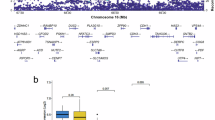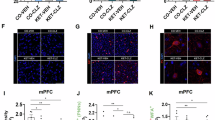Abstract
The use of neonatal ventral hippocampal nVH lesioned rats is well established in animal models of schizophrenia. Moreover, the dysfunction of N-methyl-D-aspartate (NMDA) neurotransmission may play a crucial role in the pathophysiology of schizophrenia. To examine the effect of glycine (GLY) in this animal model, we compared the effects of GLY (0.8 and 1.6 g/kg, IP) on locomotor activity induced by a novel environment (NOVEL) and methamphetamine (MAP, 1.5 mg/kg, IP) in lesioned and sham-operated rats. Compared with sham rats, GLY significantly reduced NOVEL- and MAP-induced locomotor activity in lesioned rats (p < .001 and p < .05, respectively). It is suggested that GLY attenuated nVH-induced hyperactivity, and that this effect was evident both in the presence and absence of MAP. The nVH lesions may result in a form of hyperactivity that differs from normal locomotion in the degree to which it is highly sensitive to regulation by GLY.
Similar content being viewed by others
Log in or create a free account to read this content
Gain free access to this article, as well as selected content from this journal and more on nature.com
or
References
Goff DC, Evins AE . (1998): Negative symptoms in schizophrenia: neurobiological models and treatment response. Harv Rev Psychiatry 6: 59–77
Heresco-Levy U, Javitt DC, Ermilov M, Mordel C, Silipo G, Lichtenstein M . (1999): Efficacy of high-dose glycine in the treatment of enduring negative symptoms of schizophrenia. Arch Gen Psychiatry 56: 29–36
Javitt DC, Zukin SR . (1991): Recent advances in the phencyclidine model of schizophrenia. Am J Psychiatry 148: 1301–1308
Javitt DC, Sershen H, Hashim A, Lajtha A . (1997): Reversal of phencyclidine-induced hyperactivity by glycine and the glycine uptake inhibitor glycyldodecylamide. Neuropsychopharmacology 17: 202–204
Johnson JW, Ascher P . (1987): Glycine potentiates the NMDA response in cultured mouse brain neurons. Nature 325: 529–531
Kato K, Shishido T, Ono M, Shishido K, Kobayashi M, Suzuki H, Nabeshima T, Furukawa H, Niwa SI . (2000): Effects of phencyclidine on behavior and extracellular levels of dopamine and its metabolites in neonatal ventral hippocampal damaged rats. Psychopharmacology 150: 163–169
Kleckner NW, Dingledine R . (1988): Requirement for glycine in activation of NMDA-receptors expressed in Xenopus oocytes. Science 241: 835–837
Lipska BK, Jaskiw GE, Weinberger DR . (1993): Postpubertal emergence of hyperresponsiveness to stress and to amphetamine after neonatal excitotoxic hippocampal damage: A potential animal model of schizophrenia. Neuropsychopharmacology 9: 67–75
Lipska BK, Weinberger DR . (1996): Hippocampal damage in the neonatal rat as a model of some aspects of schizophrenia In Kato N. The Hippocampus: Functions and Clinical Relevance. Amsterdam, Elsevier, 465–475
Yadid G, Pacak K, Golomb E, Harvey-White JD, Lieverman DM, Kopin IJ, Goldstein DS . (1993): Glycine stimulates striatal dopamine release in conscious rats. Brit J Pharmacol 110: 50–53
Author information
Authors and Affiliations
Corresponding author
Rights and permissions
About this article
Cite this article
Kato, K., Shishido, T., Ono, M. et al. Glycine Reduces Novelty- and Methamphetamine-Induced Locomotor Activity in Neonatal Ventral Hippocampal Damaged Rats. Neuropsychopharmacol 24, 330–332 (2001). https://doi.org/10.1016/S0893-133X(00)00213-X
Received:
Revised:
Accepted:
Issue date:
DOI: https://doi.org/10.1016/S0893-133X(00)00213-X
Keywords
This article is cited by
-
Procognitive and antipsychotic efficacy of glycine transport 1 inhibitors (GlyT1) in acute and neurodevelopmental models of schizophrenia: latent inhibition studies in the rat
Psychopharmacology (2009)
-
Glycine and d-serine, but not d-cycloserine, attenuate prepulse inhibition deficits induced by NMDA receptor antagonist MK-801
Psychopharmacology (2008)
-
Abnormally persistent latent inhibition induced by MK801 is reversed by risperidone and by positive modulators of NMDA receptor function: differential efficacy depending on the stage of the task at which they are administered
Psychopharmacology (2008)
-
N-Methyl-d-aspartate receptors as a target for improved antipsychotic agents: novel insights and clinical perspectives
Psychopharmacology (2005)



